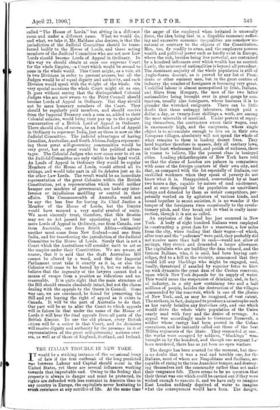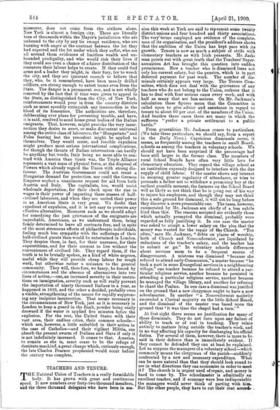THE ITALIAN TROUBLE IN NEW YORK.
IT would be a striking instance of the occasional irony of fate if the first outbreak of the long predicted war between Labour and Capital should occur in the United States, yet there are several influences working towards that improbable end. Owing to the feeling that property is always in danger and must be protected, its rights are defended with less restraint in America than in any country in Europe, the capitalists never hesitating to Grua resistance at any sacrifice of life. At the same time the anger of the employed when irritated is unusually fierce, the idea being that in a Republic economic suffer- ing and excessive economic inequalities are somehow un- natural or contrary to the objects of the Constitution. Men, too, fly readily to arms, and the employers possess wealth and political power such as hardly exist in Europe, where the rich, besides being less powerful, are restrained by a hundred influences over which wealth has no control. Lastly, the mixture of nationalities is beyond all precedent. The dominant majority of the whole population is still of Anglo-Saxon descent, as is proved by any list of Presi- dents or other emineut men, but in the great centres of industry the number of foreigners is becoming very great. Unskilled labour is almost monopolised by Irish. Italians, and Slays from Hungary, the men of the two latter nationalities being brought over in great gangs by con- tractors, usually also foreigners, whose business it is to plunder the wretched emigrants. There can be little doubt that these unhappy labourers, though paid a dollar a day, or twenty-four shillings a week, are among the most miserable of mankind. 1:ruder pretext of repay- ing themselves, the contractors sweat their wages, rent is enormously high, and the emigrants, whose single object is to accumulate enough to live on in their own European villages, absolutely will not spend. the whole of what remains to them in leading decent lives. They herd together therefore in masses, defy all sanitary laws, eat the least wholesome food, and perish of sickness, there is reason to believe, like the poorest class in besieged cities. Leading philanthropists of New York have told us that the slums of London are palaces in comparison with some of the foreign quarters of their own city, and that, as compared. with the lot especially of Italians, our unskilled. workmen when they speak of poverty do not know what it is. Disappointed, overworked by at least two hours a day, capable by nature of mad excitement, and at once despised by the population as uncivilised beings and detested by them as unfair competitors, per- petually worked on by agitators of various kinds, and bound together in secret societies, it is no wonder if the temper of the foreigners rises occasionally to the revolu- tionary pitch, and they break out in what is really insur- rection, though it is not so called. An explosion of the kind. has just occurred in New York. A body of eight hundred Italians were employed in constructing a great dam for a reservoir, a few miles from the city, when finding that their wages—of which, after rent and the " padrones" were paid, they probably did not receive more than half in cash—would not allow of savings, they struck and demanded. a larger allowance. The capitalists who are building the dam refused, and the furious Italians, who, it is said, had been buying cart- ridges, fled. to a hill in the vicinity, announced that they would. kill any blacklegs who might be engaged, and, finally, threatened if assailed. by superior force to blow up with dynamite the great dam of the Croton reservoir, upon which New York depends for its supply of water. This would mean the suspension of drinking, and, in fact, of industry, in a city now containing two and a half millions of people, besides the destruction of the villages commanded by the reservoir, which is one of the glories of New York, and, as may be imagined, of vast extent. The strikers, in fact, designed to produce a catastrophe such as has rarely befallen any first-class city, and one which would drive the whole white population of the Union nearly mad with fury and the desire of revenge. An appeal was accordingly made to Governor Roosevelt, a soldier whose energy had been proved in the Cuban operations, and he instantly called out three of the best Militia regiments of the State. They responded at onc‘, the works were occupied by soldiers, "blacklegs" were brought in by the hundred, and though one sergeant been murdered, there has as yet been no open warfare, The danger has been averted for the moment, but tiler, is no doubt that it was a real and terrible one, for the Italians, most of whom are Neapolitans and Sicilians, are capable of rising to the true Anarchist temper, and destroy- ing themselves and the community rather than not make their vengeance felt. There seems to be no question that their threat was one which could be carried out if they were wicked enough to execute it, and we have only to imagine East London suddenly deprived. of water to imagine•what the consequences would have been. The danger, ruereover, does not conie fron3 the strikers alone. New York is almost a foreign city. There are literally tens of thousands within the Mayor's jurisdiction who are unbound to the city by any tie except residence, who are burning with anger at the-contrast between the lot they bad expected and the lot under which they suffer, who see all around them evidences of limitless wealth and un- bounded prodigality, and who would risk their lives if they could see even a chance of a fairer distribution of the resources their labour.belps to create. If they could find arms and a leader they might, in their fury, try to wreck the city, and they are ignorant enough to believe that they, who, be it remembered, have been mosely drilled soldiers, are strong enough to extort terms even from the State. The danger is a permanent one, and is not wholly removed by the fact that if time were given to appeal to the State, as distinguished from the City, of New York, reinforcements would pour in from the country districts such as must speedily extinguish any insurrection in the blood of its fomenters. The authorities are, therefore, deliberating over plans for preventing trouble, and have, it is said, resolved to send home great bodies of the Italian emigrants. That, however, might provoke the very insur- rection they desire to avert, or make discontent universal among the entire class of labourers, the "Hungarians" and Poles fearing lest the precedent might be applied to themselves. They would resist, and forcible expulsion might produce most serious international complications, for though the threats of Italian intervention can hardly be anything but words, Italy being no more able to con- tend with America than Spain was, the Triple Alliance represents a vast mass of physical force, at the disposal of Powers which already regard the Union with strong dis- favour. The Austrian Government could not resist a Hungarian demand for protection, nor could the German Emperor neglect a unanimous request for aid from both Austria and Italy. The capitalists, too, would resist wholesale deportation, for their check upon the rise in wages is their power of importing these masses of half- civilised labourers, and when they are united their power in an American State is very great. We doubt that expedient of expulsion, and it is not easy to perceive any effective alternative. Measures such as we should adopt for remedying the just grievances of the emigrants are improbable, Americans, as we understand them, being firmly determined to leave all contracts free, and in spite of the most strenuous efforts of philanthropic individuals, feeling much less sympathy with the sufferings of their half-civilised guests than would be entertained in London. They despise them, in fact, for their unreason, for their superstitions, and for their consent to live without the conveniences of civilised life. They regard them, if the truth is to be brutally spoken, as a kind of white negroes, useful while they will provide cheap labour for rough work, but otherwise rather a nuisance to the general community. They will, therefore, we fancy, be forced by circumstances and the absence of alternatives into two lines of action,—one, an increased severity in their restric- tions on immigration, severity such as will really prevent the importation of ninety thousand Italians in a year, as happened in 1899, and the other a decided, probably even a visible, strengthening of the means for rapidly suppress- ing any incipient insurrection. That seems necessary in the circumstances of New York. just as it is necessary in London to keep a guard in the Bank, powder being easily drowned if the water is applied five minutes before the explosion. For the rest, the United States with their vast area, their endless cities, their common schools— which are, however, a little enfeebled in their action in the case of Catholics—and their vigilant Militia, can absorb the present swarm of Italians and Slays if only it is not indefinitely increased. It comes to that. America, to remain as she is, must cease to be the refuge of destitute mankind, a great change which, curiously enough, the late Charles Pearson prophesied would occur before the century was complete.



































 Previous page
Previous page